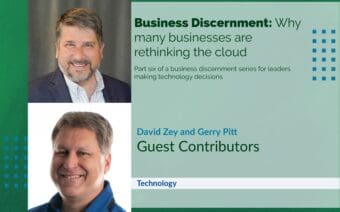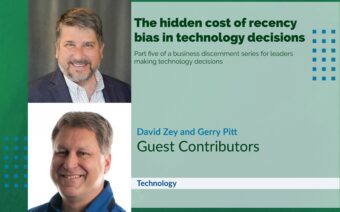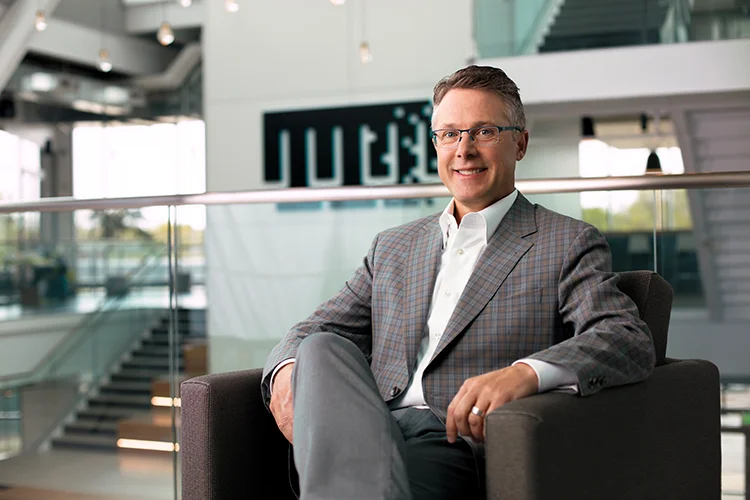
April 5, 2023
ASHWAUBENON – When TitletownTech – the seed-stage venture capital firm formed out of a partnership between the Green Bay Packers and Microsoft – started its journey in 2019, a key piece to the puzzle of its success was the entrepreneur in residence position.
TitletownTech (TTT) Managing Director Jill Enos said successful entrepreneurs often have unique experiences and expertise that make them invaluable resources for those just starting out.
“Anytime you’re building a company and supporting people who are building companies, you have to have a positive outlook about what is possible,” she said.
As Aaron Kennedy – the first to hold the position of entrepreneur in residence at TTT – wraps up his four-year commitment in the position, Enos said there was no better person to get things started.
“Aaron’s personality embodies everything you want in an entrepreneur in terms of just an inherent optimist,” she said. “He brought energy and gave confidence to people just by encouraging them to have confidence in what they were doing and how they were doing it. He is just an incredible personality.”
Been there, done that
Founder of Noodles and Company, brand manager for Pepsi Cola Company, on the Oscar Meyer team that developed and launched Lunchables – the list of successes Kennedy has racked up throughout his career are endless.
“I was kind of an entrepreneur straight out of the womb,” he laughed. “I was helping my parents with garage sales at a very young age.”
Kennedy said he started his first “real business” when he was eight years old – selling seed packages door to door.
“I’d knock on the door – a little eight year old enthusiastically knocking on the door – with the Burpee Seed catalog,” he said. “I’d come back and collect the order sheets from everybody. I had about 15-20 clients.”
Kennedy said he did that for about a year and a half before realizing there was even more potential.
“I started selling greeting cards seasonally, as well,” he said. “I remember I had a little cigar box that I kept all my revenue in. That was my first entrepreneurial experience.”
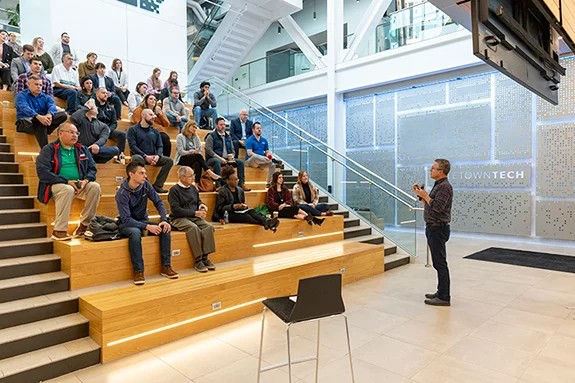
As TitletownTech’s entrepreneur in residence, Aaron Kennedy, front, served as a mentor and coach to startup entrepreneurs. Photo Courtesy of TitletownTech
Kennedy said much has changed since then, but his entrepreneurial spirit never wavered.
He obtained his bachelor’s degree in English and journalism from Augustana College and his MBA in brand management from the University of Wisconsin-Madison.
“(While at Madison), I worked for Oscar Meyer part time – 20 hours a week – and then full-time in the summer in the new product development department,” he said. “I was part of the eight-person team that helped create Lunchables. We took it from a concept called lunch packs – which was one of the 100 concepts when I joined the company at the beginning of January 1987. We selected the idea, and then optimized the packaging, the name, the components and the marketing.”
After graduating from grad school, Kennedy said he joined the brand management team for Pepsi.
“I thought it was the funniest marketing job in America at the time,” he said. “Because if you had an idea, and you have moxie to do it – they’d let you do it.”
Kennedy said he was part of the team that created the Rock N’ Jock Diamond Derby – a television series on MTV featuring actors/musicians/entertainers playing sports with professional athletes.
“That included all the brand strategy and television commercials,” he said. “I learned how to dance Hammer Time from MC Hammer – I can still do a decent rendition of it.”
From there, Kennedy said he was hired by a Paris-based brand design firm that had an office in New York.
Shortly after, Kennedy stumbled upon a little Asian noodle shop on Hudson Street in the West Village of Manhattan that changed his life forever.
“I stepped in there and instantly my life changed just walking through the front door,” he said. “Before noodle shops became popular, you’d have to go to a Japanese restaurant for Yakisoba and a Thai restaurant for Thai or an Indonesian restaurant for peanut saute. This noodle shop, however, had like 10 of the top Asian noodle dishes on one menu.”
Kennedy said he ordered two or three different items because “I was so captivated by the concept.”
“I’m walking down the sidewalk afterward with all of my leftovers, and it hit like a lightning bolt – people all over the world grew up eating pasta and noodles,” he said. “Why not put – not just Southeast Asian ones – but all noodle dishes on one menu.”
Kennedy said he was completely “dumbstruck” with the idea.
“I couldn’t think about anything else,” he said. “I couldn’t do the job that I was hired to do really well – and I hate doing anything other than top notch. But my heart was totally in this little global noodle shop concept.”
Kennedy said he wrote a business plan – “the ideas were just flowing out of me” – quit his job, returned to Boulder, Colorado – where he was commuting to New York from at the time (where his wife was living) and started Noodles & Company.
“I started Noodles & Company and opened the first location in the fall of 1995,” he said. “We slowly survived intense struggles of optimizing a business model into something that would survive and be stable.”
Noodles & Company opened its second and third locations in Madison – 1,000 miles from the first one, which Kennedy said was “pretty unusual.”
Kennedy said they made enough “right choices” to survive and eventually things took off.
“We grew the business – about 20 new restaurants a year, all company-owned, these weren’t franchises,” he said. “We didn’t even have a franchise location at all until we were up to about 60 locations.”
Kennedy said in 2005, he decided it was time to hire a “seasoned” restaurant professional.
“Because as you heard from my background, I’ve never worked in a restaurant. I’ve never started a business. I hadn’t run a business, and I never really managed people. So, I really had no business being successful. If you held that up, you wouldn’t bet on me.”
Kennedy hired the chief operating officer from Chipotle to do the job.
“I worked with him (side-by-side) for about a year and then moved out of the office for two years and mentored from a distance,” he said.
Then in 2008, Kennedy said he realized it was time to move on.
“After coming out of a board meeting, I walked out in the bright sunshine and said, ‘I think I finished what I started,’” he said. “My original goal with the whole thing was to prove the validity of the global noodle concept by building 20-40 restaurants across five, geographically diverse cities across the country in seven years.”
Kennedy said it was in that moment that he decided to step away – knowing he had accomplished what he’d set out to do.
“I came to the next board meeting with a framed shadowbox for each board member,” he said. “Inside the shadowboxes, I took pieces of our original, vintage menu from the first Noodles & Company and cut it into seven jigsaw puzzle pieces and mounted those onto an original piece of Noodles and Company letterhead. I wrote a personalized letter to each board member with what they have contributed. The very last line was the same for all seven which read, ‘you seven are going to noodle on without me.’ And that is how I resigned from my role completely.”
Beginning at TTT
After stepping away from Noodles & Company, Kennedy said he held a variety of positions, as well as served on a handful of boards.
He said he first learned about TTT and its desire to bring on an entrepreneur in residence after he spoke at the Wisconsin Technology Association’s annual conference.
About two weeks later, Kennedy said the president of the Wisconsin Technology Association said the UW-Madison chancellor wanted to speak to him about a “technology incubator thing” up in Green Bay.
“They reached out to me, and said they were looking for an entrepreneur in residence, so I started to give them some names,” he said.
Kennedy said they eventually interrupted and said “we don’t want names, we want you.”
“There was a long pause,” he said. “Recalibrating – I responded, ‘you said it was an entrepreneur in residence, and I live in Boulder Colorado.’ They said, ‘oh, don’t worry about that – just come and take a look.’”
So Kennedy made his way to Green Bay.
“Of course, Ed Policy (chief operating officer and general counsel for the Packers), Mark Murphy, Craig Dickman and the UW-Madison chancellor at the time are all incredibly compelling and convincing people,” he said. “But they are also all incredibly competent and had a vision to create this place called TitletownTech.”
Kennedy said they walked him through the construction site of where TTT sits today and shared with him the details behind the idea.
“They said we’ll come up with a schedule that works for you,” he said.
Since that discussion, Kennedy, who wrapped up his fourth year in the role at the end of March, said he’s made about 50 trips to Green Bay.
Implementing the vision
Kennedy said when he first started in the entrepreneur in residence role with TTT, there weren’t any companies, and part of his work in the beginning focused on finding some.
“The first (step) was to work collaboratively with the team to figure out how to source potential investments, how to source companies to invest in…,” he said. “What those deal terms might look like, that were entrepreneurial friendly – which is pretty uncommon in venture capital space, normally it’s all investor slated.”
Kennedy said once TTT had a few investments, he completely transitioned his role over to mentoring and coaching the entrepreneurs.
“(I did) what I’m best at, which is helping entrepreneurs see the path ahead for them, so they don’t run smack dab into a tree or trip over a log – to help fill the knowledge gaps that they may have,” he said.
Kennedy said most entrepreneurs come with a specific skill-set – one, two or maybe three functions.
“They know how to develop the product, or they’re sales-oriented, or maybe they’re a financial person,” he said. “But there is HR, there’s branding, there’s the board, there’s capital raising – all of these are skills that an entrepreneur needs to be good at, or the team needs to be eventually, to survive.”
Kennedy said his role focused on coaching and mentoring entrepreneurs to help fill those gaps until they could hire team members.
“So, capital strategy – how we capitalize a business,” he said. “The organizational structure strategy, brand development, strategy, sales strategy, the HR piece, which includes compensation, benefits, onboarding. I preached that the No. 1 driver of success for nearly every business is the talent level, the commitment level, their alignment, like they’re collaborating, working in unison toward a common vision. It’s all about the people in the end. In some cases, I helped entrepreneurs think about what the next talent to bring into the business should be.”
Impact on TTT, himself
Kennedy said his work at TTT was “the single best use of my skill-set.”
“Where am I going to make the greatest impact – that is what I said to myself in the beginning of this,” he said. “It has certainly gone much better than I thought it would. I feel like I couldn’t have made a greater impact on the world doing anything else.”
Enos said Kennedy set a “great standard” in helping TTT get its first set of companies into the model of how you think about growing an early-stage business.
“He’s exceptionally talented at empathetic communication with founders to hear where they are and to help them kind of see what’s next,” she said.
Enos said Kennedy was a “natural fit” for the role.
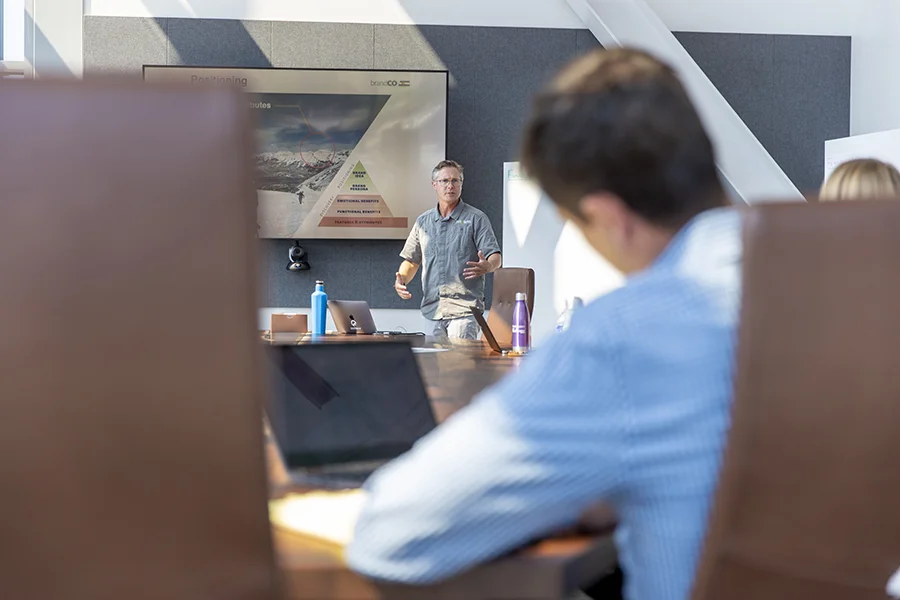
Aaron Kennedy, center, said his time as entrepreneur in residence at TitletownTech was one of the “most gratifying” things he’s ever done. Photo Courtesy of TitletownTech
“He understood how to grow a business, but he also understood what founders go through and could share in their journey with them in a really supportive way,” she said. “He was the perfect coach for that. We were so pleased with what he’s been able to do with us over the last few years.”
Kennedy said while at TTT, he felt as though his days were filled with meaningful work.
“Every time I came here, I left saying, ‘Wow, that was incredible,’” he said. “Every (visit) was filled with eight to 10 of these intense meeting strategists and coaching sessions. It’s been one of the most gratifying things I’ve ever done.”
Hitting pause
Kennedy said the plan now is for him and his wife to take a six-month sabbatical.
“About five years ago, my wife and I picked the middle of 2023 as a time period where we would step away from all of our current professional pursuits,” he said. “I’m not going to use the word retire, because that’s probably not me, but I’m going to take a six-month sabbatical and let my brain rest, decompress from this work – and create space for the world to bring me my next to do what to do next.”
What that next will look like, Kennedy said he isn’t sure at this point, but said his time at TTT is likely not done completely.
“There’s a chance that I’ll have a role of a completely different scale here on TTT,” he said. “So, I may be doing that to keep a thread. Maybe coming back one or two times a year rather than 12.”
Enos said TTT “will continue working with Aaron in a capacity that advances” its mission.
Next entrepreneur in residence
In terms of filling the now vacant position of entrepreneur in residence, Enos said what that will look like is still being formalized.
“We again want the University of Wisconsin System represented and connected so that we really can deepen our ties with it,” she said. “We need talented people who can connect and understand founders to help them get to the next level. Someone who can be a coach and guide them as they go through their own journey and build what’s next for them.”
Enos said having an entrepreneur in a residence position at TTT is important because it’s an example of someone who’s “been there, done that.”
“This person’s been in your shoes and has experienced some of the pain and joy that you are going through and can help you to think through it,” she said. “It is someone who has their own experiences and hard lessons learned that can help you to not have to learn the same ones and jump ahead and move faster.”
Enos said Kennedy has “absolutely done a tremendous job” in the role for TTT’s first fund.
“In our second fund, we will expand that role and have the capacity to do a few different things,” she said. “We will not try to replicate Aaron Kennedy. He’s certainly cut from his own cloth, and not one we can just make a repeat of – but he’s really helped us lay the groundwork for some of the things we want to continue to do.”
 Vines & Rushes Winery: Wisconsin-grown wine with every sip
Vines & Rushes Winery: Wisconsin-grown wine with every sip A ‘Haven’ of blueberries awaits pickers in Bear Creek
A ‘Haven’ of blueberries awaits pickers in Bear Creek


